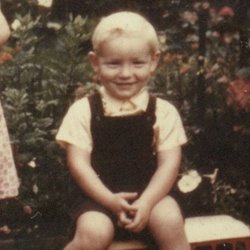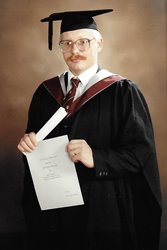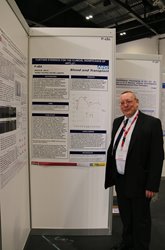Pat Letendre interviews our TM colleagues - past & present:
It's my pleasure, indeed an honour, to write a series of blogs for CSTM to celebrate the careers of transfusion professionals who came before and made a difference. Some names you may recognize, some you may not. But rest assured they all made a difference and we are the better for it.
Each blog begins with a brief background on the person's career, followed by musings on their career and my comments throughout. Although all participants enjoyed their careers and love the transfusion profession, they speak honestly about both the ups and downs. Perhaps their reflections will resonate with your experiences.
I will remember you: Malcolm Needs
This blog features Malcolm Needs, a UK biomedical scientist. Yes, the CSTM 'I will remember you' series has branched out to include a transfusion professional from across the pond. I'm delighted that Malcolm has generously provided his reminiscences of a long career. As you know, we need to create a record of transfusion medicine life and realities, the kind not found in published research and textbooks.
I first 'met' Malcolm about 2009, in a manner of speaking, on an American blood bank forum, BloodBankTalk, which has undergone name changes over the years and is now part of PathLabTalk. Today there's even both a UK and USA blood bank section (Further Reading).
The word
generous is one of the key words that defines Malcolm Needs. That stood out right away on 'BloodBankTalk'. Who was this guy, I wondered, who would help U.S. blood bank technologists with so many issues and who now has more than 6000 entries on the forum? And it wasn't just that he replied, it was the quality: concise, clear, sound explanations and commentary. Clearly, this British bloke was an expert, one with extensive experience and a great educator too.
Since then I've had the pleasure to get to know Malcolm better, albeit still at a distance. When asked, he once shared with me an excellent Powerpoint presentation he'd created on a topic of interest. Upon joining TraQ, of course, he sent positive feedback. Same on Twitter.
BACKGROUND
Before you can appreciate how Malcolm made a difference and understand his musings, you should know a few of his experiences. I encourage you to consider your career compared to his in the UK and how you may muse on transfusion medicine.
In brief, Malcolm began his career at the Blood Group Reference Laboratory, London and later began working in hospital transfusion services where he gained incredible experience, being involved in providing blood for transfusion after several tragedies: three IRA bombings and two train crashes, in total involving dozens dead and hundreds injured.
He then worked briefly at the
International Blood Group Reference Laboratory in Bristol before joining the Red Cell Immunohaematology (RCI) Department of the UK's national blood supplier, the National Health Service Blood and Transplant (
NHSBT), Tooting Centre, soon becoming the Reference Service Manager, a position he held until July 31, 2014.
His career was capped with a newly created post within the Red Cell Immunohaematology Dept. at NHSBT:
Reference Service Manager – Training, a national post he held until retirement 31 Oct. 2016.
For a few of Malcolm's many contributions to the UK transfusion community and beyond, see what I have struggled to make a
short resume.
In his musings below, included are [photos] Malcolm supplied featuring some of the transfusion pioneers he's met.
MALCOLM'S MUSINGS
How did you make a difference?
One of the great loves of my professional life is
having had the opportunity to GIVE BACK just some of the enormous help that I have received by way of training and education.
I fondly remember that, when I started as a callow youth of some 18 years at the Blood Group Reference Laboratory (BGRL) back in the early 1970s when it was in London, and when I knew nothing about blood groups, blood group serology or blood transfusion, I was taken under the wings of a number of
simply fantastic people who would spend hours trying to get facts through my fairly solid cranium.
To name a few, they included
To give an example of the help I was given, I used to have a cup of coffee at the end of the day (for no reason other than I wanted to miss the worst of the rush-hour), and Ken Goldsmith used to also come into the coffee room at about the same time. There was I, just out of school, sitting in the same room as a world-famous physician and scientist, and he would spend a minimum of an hour explaining something like the structure of the ABO antigens, by using the analogy of a British Rail shunting yard.
Across the car park was the
MRC Blood Group Unit, run by
Drs. Rob Race and Ruth Sanger. Included in their staff, amongst others, were
In short, what I am saying is that I could not have been luckier, and all of these people, every single one of them, spent time with me, teaching me the basics and, eventually, the more complex aspects of blood group serology.
I have also been incredibly lucky in that I was able to meet many of the world’s “greats” in terms of blood transfusion, as they visited either one or both of these establishments, and, to name just a few, these luminaries included
Some start to a professional life for a lad just out of school!
BOTTOM LINE:
Unless I had no morals and no conscience, I had no alternative than to pass on to others what I had been taught myself. Initially, this was not easy, as I had lost my father to cancer when I was about 14, had been to a single sex school (the only contact I had with these strange things called “females” were my relatives), was achingly shy and suffered from a form of agoraphobia, which meant that simply talking to a stranger, let alone lecturing to a room full of strangers, was agony.
Very early on, however, I was given a good piece of advice. This was that, as I was talking to students of my own age, few of whom were working in my particular branch of pathology, none of them would know whether or not I was talking sense! This took a huge amount of pressure off my shoulders and, as the old saying goes, I never looked back.
From these humble beginnings, I have since regularly lectured on many university courses, on courses for people undertaking the examination for Membership of the Royal College of Pathology, at symposia/congresses/courses, both within the UK and abroad in the Peoples’ Republic of China, Switzerland, Providence and Las Vegas.
What was the most fun?
As a blood group serology “nerd”, I am particularly pleased (and proud) of being either the primary author or a co-author of several abstracts and posters describing
- Novel D variants;
- Novel RHCE allele leading to a D - - phenotype;
- DOLG, a novel high prevalence antigen within the Dombrock Blood Group System.
I was also a co-author of a paper published in
Nature Genetics in 2013 entitled, “
SMIM1 underlies the Vel blood group and influences red blood cell traits.”, which was one of the three papers published simultaneously and led to Vel being elevated to a full Blood Group System.
Also equally pleased of having served twice as a member of the National Council of the
British Blood Transfusion Society, being sometime Editor of their Newsletter, and Chairing several of their sub-committees.
For the
Institute of Biomedical Science, I have served on their Special Advisory Panel for Transfusion Science, and have served as their Chief Examiner in Transfusion Science between 2012 to 2017, their representative on the Medicines and Healthcare Products Regulatory Authority (MHRA) Haemovigilance Expert Panel, their representative on the British Standards in Haematology Transfusion Task Force and their representative on the UK Transfusion Laboratory Collaborative.
I've contributed a chapter entitled, “
Human erythrocyte antigens or blood groups.” in the book
Fundamentals of Biomedical Sciences, Transfusion and Transplantation Science, edited by Robin Knight, 1
st edition, Oxford University Press 2013. It is hoped that the 2nd edition will be published in late 2017, this time edited by Professor Neil Avent, to which I am contributing two chapters, entitled, “
Compatibility testing and adverse effects.” and, “
Immune-mediated red cell destruction.”Going back to being a blood group serology nerd, I would be remiss if I didn't mention a
very special moment in my career (see below in Pat's Musings).
BOTTOM LINE:
The thing that I am most proud and pleased to have done in my career, however, is to have
made friends with so many people who have a real love and respect for the work we do, some of whom I have never actually met, and only know from such sites as
PathLabTalk (but I still feel like I really
know them, as they are so generous with their knowledge and time).
Malcolm throughout the years


 PAT'S MUSINGS
PAT'S MUSINGS
As you can see, Malcolm was one lucky bloke to have worked among many of transfusion medicine's greats. Let's face it, the 1970s were probably the Golden Age of blood group serology and in many ways UK's scientists ruled. Some came to the USA (Garattty, Issitt, Judd - all with the qualification FIBMS) to be known informally as the 'UK mafia'.
Malcolm also had the invaluable experience of working in UK hospital transfusion services when mass casualties occurred. Not events you want but, when they happen, they provide a test of fire.
Malcolm also related a
very special moment in his career, one to which anyone who loves immunohematology can relate. It's been given a page of its own as I suspect blood group serologists will love it but other readers' eyes may glaze over. I can relate because twice in my career working as a medical laboratory technologist on the bench I found what we thought was the first ever example of...only to find others had made the discovery just before us. Still, they were special moments, indeed.
I smiled at Malcolm noting that he was 'achingly shy' and talking to a stranger, let alone lecturing to a room full of strangers, was agony. Being shy and introverted myself that resonated. I recall in high school hating it when the teacher would go down a row asking questions of each student in turn. As my time came, all I could hear was my wildly beating heart and I knew my face was flushed. Today I recognize that as a panic attack associated with
glossophobia. Yes, there's even a name for it and it's apparently one of the most common phobias.
The panic attacks were one reason I initially became a high school teacher, because I knew that degree of fear had to be overcome. Malcolm made good use of advice that, when talking to non-specialists his own age, none would know whether or not he was talking sense. For me, one word did the trick. In my third career as a medical laboratory science educator (after teacher and med lab tech), whenever I went into a classroom or spoke at conferences, I would take a deep breath, let it out slowly, and say, 'Showtime!' (sometimes even aloud).
TM professional, consider this. In January 2015 I got an e-mail request from
Dr. Eric Hoy, a fellow I know who taught at the University of Texas Southwestern Medical Center in Dallas. He wrote in part:
'While I was at UT, I stumbled upon an online group of blood bankers from the UK. As I recall, one of the frequent posters was a chap named Malcolm Needs, and I learned a great deal from him. Unfortunately, when I retired from UT, my email connection was cut off about 30 milliseconds after my retirement took effect, and I lost all of my contacts. Are you aware of this list, and can you provide a link so that I can re-subscribe? I may be retired from UT, but I still direct my laboratory, and I still love Immunology and Immunohematology.'
Seems that quality and generosity are recognized worldwide and Malcolm exemplifies both.
Stay tuned for a second blog in which Malcolm muses on the transfusion 'notables' he has known over the years. In yet a third blog, he will discuss regrets and concerns.
Comments are most welcome. Please add to the record of what it was (or is) like to work as a transfusion professional in the UK. Or maybe you'd care to comment on the joy of blood group serology? Or the joy of public speaking?
Further Reading